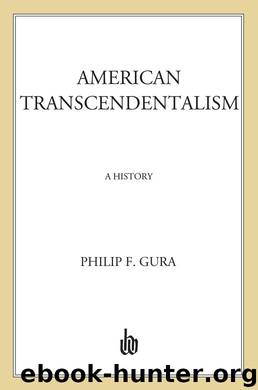American Transcendentalism by Philip F. Gura

Author:Philip F. Gura
Language: eng
Format: epub
Publisher: Farrar, Straus and Giroux
Published: 2011-04-26T16:00:00+00:00
In 1848 the government functionary and aspiring writer George Wood (1799-1870) published Peter Schlemiel in America, a rollicking satire of contemporary American life. In the course of the novel Peter converses with a series of cultured people on topics that allowed Wood free rein to pillory the intellectual and cultural foibles of his contemporaries. Among these were Unitarianism; its stepchild, Transcendentalism; and the Fourierist movement. In the course of conversation a Mrs. Julia Smith relates how, a few years earlier, a distinguished clergyman from the city of Boston introduced her to “an entirely new set of opinions.” Soon she learned from his sermons that much of what she had assumed as Christian doctrine was erroneous. As she gradually realized that the Bible was not what she had taken it to be, God’s revealed word, but was only a set of myths and stories assembled over the years by apologists for their own brand of Christianity, “the Redeemer was shorn of his divinity.” 23 When Wood wanted to poke the most fun at the New Englanders’ extreme religious views, however, he cribbed his words from a text cited simply as “Studies in Religion,” which to him epitomized fatuous Transcendentalist language.24
He was referring to Eliza Thayer Clapp’s anonymously published Studies in Religion. Born in 1811 in Dorchester, Massachusetts, adjacent to Boston, Clapp lived there her whole life, never marrying.25 Early on she moved from her orthodox faith to Unitarianism, and for many years she taught Sunday school to teenage girls. Like many others, she gradually made the transition to Transcendentalism and numbered among her close friends both Elizabeth Peabody and William Henry Channing. Describing her religious pilgrimage, she wrote, “When I was sixteen I was a belligerent Unitarian, while my friends were mild seceders from orthodoxy.” “In my twenties,” she continued, “when Unitarianism was in the ascendant, I was caught off into the aerial regions of Mr. Emerson and the iconoclastic zeal of Mr. Parker.”26 Believing in the ethic of self-culture popularized by William Ellery Channing and cultivated by the Transcendentalists, in her home she gave classes to young women, gratis, in history, literature, and philosophy. She read from and commented on texts and then elicited discussion, much as Fuller did. Never having sought a public life, Clapp’s lasting influence came through this teaching, for which she was highly praised.
She also wrote poetry, which Emerson applauded. Its “objectiveness” most pleased him, he noted. He also admired Clapp’s “fidelity of observation,” for she had “a true eye” and could “see the fact as it appears,” allowing her to express “some law of this Divine Life of ours.” He returned her poems with comments and suggestions, and eventually published several in The Dial, both on Fuller’s watch and his.27
Clapp published little else save some occasional pieces in The Christian Register, a Unitarian paper, and her Studies in Religion, the work from which Wood quoted so often. Clapp’s little book, however, identified only as by “the Author of Words in a Sunday School” (the title of her book of Sabbath lessons), circulated widely among Transcendentalists.
Download
This site does not store any files on its server. We only index and link to content provided by other sites. Please contact the content providers to delete copyright contents if any and email us, we'll remove relevant links or contents immediately.
| Africa | Americas |
| Arctic & Antarctica | Asia |
| Australia & Oceania | Europe |
| Middle East | Russia |
| United States | World |
| Ancient Civilizations | Military |
| Historical Study & Educational Resources |
In Cold Blood by Truman Capote(3374)
The Innovators: How a Group of Hackers, Geniuses, and Geeks Created the Digital Revolution by Walter Isaacson(3137)
Steve Jobs by Walter Isaacson(2888)
All the President's Men by Carl Bernstein & Bob Woodward(2362)
Lonely Planet New York City by Lonely Planet(2213)
And the Band Played On by Randy Shilts(2193)
The Room Where It Happened by John Bolton;(2150)
The Poisoner's Handbook by Deborah Blum(2131)
The Innovators by Walter Isaacson(2096)
The Murder of Marilyn Monroe by Jay Margolis(2093)
Lincoln by David Herbert Donald(1981)
A Colony in a Nation by Chris Hayes(1926)
Being George Washington by Beck Glenn(1905)
Under the Banner of Heaven: A Story of Violent Faith by Jon Krakauer(1788)
Amelia Earhart by Doris L. Rich(1686)
The Unsettlers by Mark Sundeen(1682)
Dirt by Bill Buford(1669)
Birdmen by Lawrence Goldstone(1661)
Zeitoun by Dave Eggers(1643)
